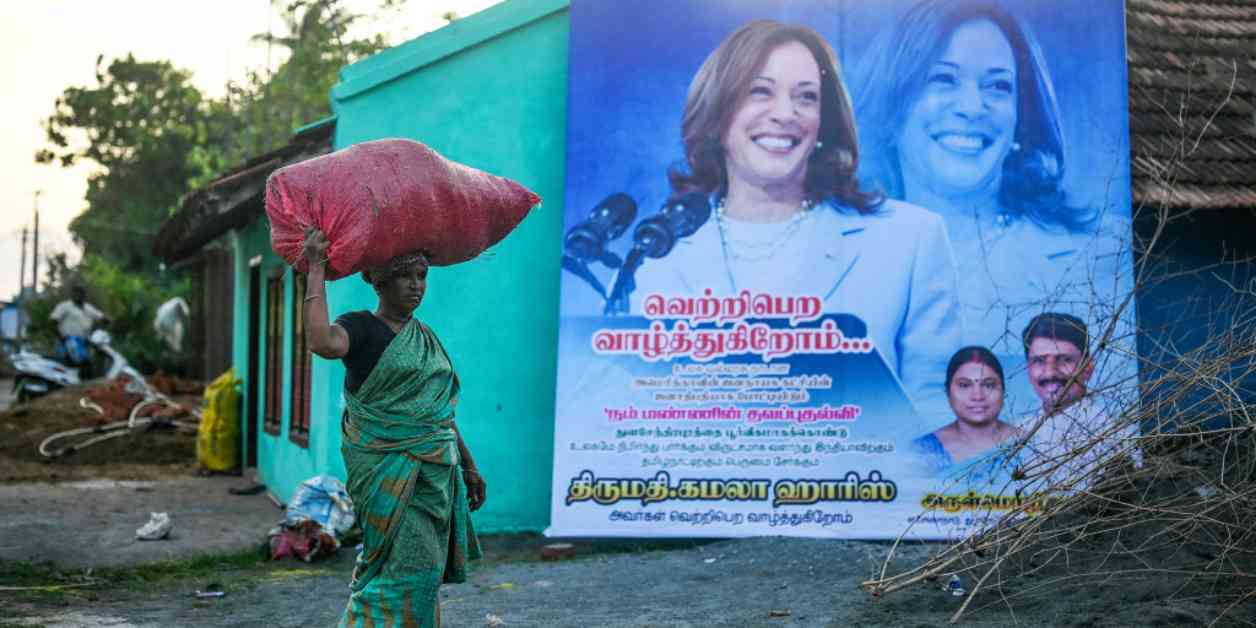Thulasendrapuram, a small village in southern India, is abuzz with excitement and pride as one of its own, Kamala Harris, vies for the highest office in the United States. The village, home to Harris’ maternal grandparents, has been rallying behind the Democratic nominee, displaying banners and planning celebrations in anticipation of her potential victory in the presidential election.
Pride and Support from Thulasendrapuram
The people of Thulasendrapuram had little knowledge of Kamala Harris until she rose to prominence as the U.S. vice president. Now, they proudly showcase banners of Harris, affectionately referring to her as the “daughter of this land.” Kadir Kathiravan, a local printing press owner, expressed the village’s sentiment, stating, “We are very proud of her.” The excitement in Thulasendrapuram reached new heights when Harris made history as the first woman, first Black American, and first Asian American to hold the position of vice president in 2021.
Despite growing up in the United States, Harris’ family maintained strong ties with India, with her mother, Shyamala Gopalan, hailing from Madras (now Chennai), Tamil Nadu. Harris has often acknowledged the influence of her Indian heritage on her upbringing and career, emphasizing the importance of her ancestral roots. In a touching tribute to her late mother, Harris scattered her ashes on the beach in Chennai, symbolizing the enduring connection to her Indian heritage.
Thulasendrapuram has become a focal point of support for Harris, with villagers proudly displaying her name at the village’s main temple and actively participating in celebrations surrounding her political achievements. N. Krishnamurthy, a retired bank manager and local resident, shared his gratitude for Harris putting their village on the map, stating, “We are very grateful because this small dot nobody knew about has now become worldwide famous.” The villagers eagerly await the outcome of the presidential election, ready to celebrate with fireworks and sweets if Harris emerges victorious.
Rising Influence of Indian Americans in U.S. Politics
The success of Kamala Harris reflects a broader trend of Indian Americans making significant strides in American politics. With the emergence of leaders like Rep. Ami Bera and the “samosa caucus,” comprising representatives of Indian descent, the political landscape in the United States is diversifying. Indian Americans have been actively engaging in various levels of government, from school board races to statewide elections, signaling a growing presence and influence within the political sphere.
The Indian diaspora in the U.S. plays a pivotal role in shaping electoral outcomes, with a sizable population that tends to lean Democratic. The mobilization of South Asian voters, particularly in battleground states, has the potential to sway election results and impact the trajectory of American politics. As Harris seeks to secure the presidency, the support of Indian Americans could prove instrumental in determining the outcome of the race.
Challenges and Opportunities for Harris
As Kamala Harris navigates the complexities of a presidential campaign, she faces scrutiny and challenges that come with her unique background. Questions about her racial identity and heritage have been raised, with former President Donald Trump attempting to undermine her credibility by casting doubt on her background. Harris’ dual identity as an Indian American and Black woman has been a point of contention, highlighting the intersectionality of her identity and the complexities it presents in a polarized political landscape.
While Harris’ Indian heritage has garnered support and admiration from the Indian community, there are expectations for her to actively engage with issues related to India and its interests. As a potential future president, Harris has the opportunity to leverage her background to strengthen U.S.-India relations and address shared concerns between the two nations. However, her limited foreign policy experience raises questions about her capacity to navigate complex international dynamics effectively.
The Future of U.S.-India Relations
The U.S.-India relationship stands at a pivotal juncture, with opportunities for collaboration and cooperation across various sectors. As Harris charts a course for the presidency, the potential for enhanced engagement with India presents a unique opportunity to bolster bilateral ties and address mutual challenges. The strategic partnership between the two countries holds immense potential for economic growth, security cooperation, and shared values that underpin a strong alliance.
While Harris’ ascent to the presidency would mark a historic moment for Indian Americans and the Indian diaspora, it also signifies a shift in the political landscape towards greater diversity and representation. The voices of Indian Americans are being heard and acknowledged, contributing to a more inclusive and pluralistic democracy that reflects the rich tapestry of American society.
In Conclusion
Kamala Harris’ journey from Thulasendrapuram to the pinnacle of American politics is a testament to the resilience, determination, and diversity that define the fabric of the United States. As she continues her quest for the presidency, Harris embodies the hopes and aspirations of millions of Indian Americans and reflects the changing face of American leadership. The support and pride emanating from Thulasendrapuram serve as a poignant reminder of the interconnectedness of global communities and the power of representation in shaping political discourse and decision-making.



























